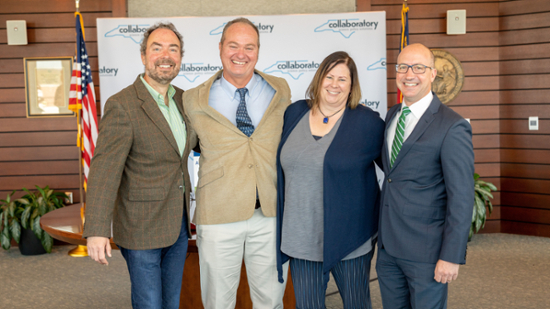
CCEE professor Dr. Detlef Knappe was chosen as the Spring 2023 Fellow of the Department of Environmental Quality (DEQ) Applied Research Fellowship. The award, which was recently launched by the North Carolina DEQ and North Carolina Collaboratory, was created to advance research of per- and polyfluoroalkyl substances (PFAS) in North Carolina, strengthening the partnership between state regulators and academic experts.
“This fellowship is an opportunity for DEQ and the leading scientific experts on PFAS to work together to improve our understanding of these forever chemicals and generate the scientific data we need to protect our communities and protect our drinking water,” said Secretary Elizabeth S. Biser in a release.
A key focus of the DEQ Action Strategy for PFAS is the development of the science needed to address PFAS statewide. The Fellowship Program provides an opportunity for researchers and DEQ staff to identify and address information gaps and research needs.
“The Collaboratory and DEQ have had a long and effective partnership to better understand PFAS in our state — sharing data and methodologies, utilizing academic labs to run water monitoring samples when the EPA was impacted by the last governmental shutdown a few years back, and facilitating both informal and formal roundtables between our university experts and DEQ leadership and staff,” said Dr. Jeffrey Warren, the Collaboratory’s executive director. “This fellowship program is unique and a win-win; the faculty members will be able to better understand how scientific data are used in the policy and regulatory space while DEQ regulators can better understand how the academic investigations are designed and executed as well as how the extensive datasets are generated and analyzed.”
The fellowship program will be funded by the Collaboratory, which was established by the N.C. General Assembly in 2016. In 2018, the Collaboratory formed the NC PFAS Testing Network — a group of PFAS experts, including Knappe, who specialize in studying PFAS levels in drinking water and air samples as well as the environmental, biological and public health impacts of the chemicals.
Knappe’s research focuses on source water protection by identifying contaminants through targeted and non-targeted analyses and on the development of treatment approaches for the removal of unregulated contaminants. He led the CCEE research team that discovered and traced GenX, a man-made chemical compound, and other per- and polyfluoroalkyl substances (PFAS) in eastern North Carolina’s Cape Fear River. Knappe serves as deputy director of NC State’s Center for Environmental and Human Health Effects of PFAS, and he is also a member of NC State’s Center for Human Health and the Environment and is faculty advisor for the NC Safewater Student Chapter at NC State.
